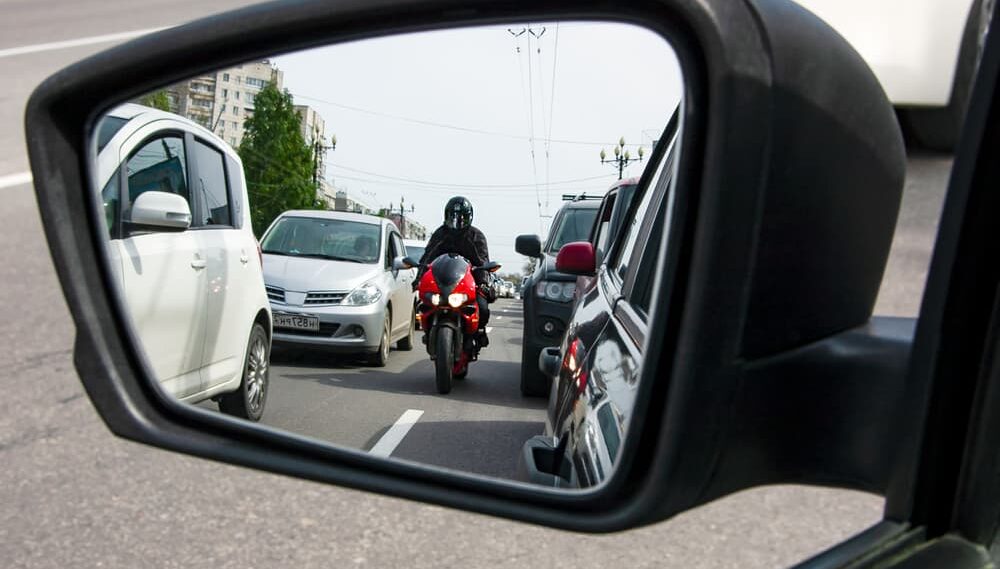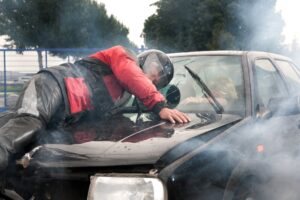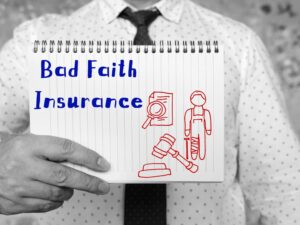
Each year, about 80,000 people suffer non-fatal injuries in motorcycle accidents. Given that motorcycles lack the enclosure and safety features of other vehicles, bike riders, and passengers account for the vast majority of those injured motorcycle accident victims.
Even though motorcycle riders are the ones who suffer the most when involved in an accident, they often face accusations of fault from other drivers and insurance companies. Unfortunately, it is not uncommon for motorcyclists to deal with biases against them when seeking compensation.
If you think you are partly to blame for the accident or the insurance company says your own negligence or recklessness was responsible for your injuries, speak with a motorcycle accident lawyer and discuss the legal options available to you.
Who Can You Hold Responsible for Your Motorcycle Accident?

Determining fault is often the most contentious part of seeking compensation after a motorcycle accident. When such accidents occur, there may be several potentially liable parties, including:
- The car driver who hit you. When a car driver hits you, they may be liable for distracted driving, failure to observe stop signs or traffic lights, speeding, or driving under the influence. Proving the car driver’s fault typically involves gathering evidence such as eyewitness accounts, traffic cam footage, and police reports.
- Other car drivers. Sometimes, it isn’t just the driver who collided with you that can be held accountable. Other drivers who played a contributing role in the accident, however indirectly, may also share responsibility. This includes drivers who might have forced the at-fault driver into your path or contributed to hazardous driving conditions leading to the crash.
- The owner of the car. If the person driving the vehicle doesn’t own it, liability can extend to the owner of the car. For example, if the owner negligently entrusted their vehicle to someone who was unfit to drive due to inexperience, intoxication, or lack of a valid license, the owner might be liable for the resulting collision.
- Employers. When accidents occur during the course of a driver’s employment, such as a delivery driver, the employer can potentially be held liable. This is under a legal doctrine known as “respondeat superior,” which may hold employers responsible for the actions of their employees if the accident occurred while they were performing job-related duties.
- Government entities. Road maintenance – or, to be more exact, the lack thereof – can play a significant role in motorcycle accidents. A government entity may be responsible if your crash was caused by potholes, unmarked hazards, defective traffic signals, or poorly designed intersections. Claims against government entities are complex, involving strict notice requirements and immunities, and understanding these nuances is necessary for a successful claim. In California, for example, injured victims must file a proper notice of the claim before suing the government under the California Tort Claims Act.
- Vehicle manufacturers. If a defect in your motorcycle or the vehicle that hit you contributed to the accident, the vehicle manufacturer can be to blame. Whether it is a defective brake system, faulty tires, or problematic steering components, manufacturers can be held strictly liable for faults in their products that harm consumers.
The liable party in your case depends on the specific circumstances surrounding your motorcycle accident. In many cases, the question of liability may be a multi-faceted process that requires the assistance of a knowledgeable motorcycle accident attorney.
Who Decides Fault in a Motorcycle Accident?
Determining fault after a motorcycle accident is an intricate matter full of legal nuances. Often, the parties involved will have conflicting opinions regarding who is to blame, making assigning fault more difficult. Below is the list of the parties who may influence the determination of fault following a motorcycle accident:
- The parties involved. The individuals directly involved in the accident often have their own perspective on what happened. The motorcyclist and other drivers all have a say that may influence the determination, but ultimately, they do not have the final decision-making power.
- Law enforcement. Officers responding to the accident scene are responsible for making an initial assessment. They will compile a police report, including details about the accident and the officer’s judgment about who might have been at fault based on the evidence present at the scene.
- Insurance companies. Insurance adjusters from the companies representing the parties involved in the accident will usually conduct their own investigation. The adjusters will use the information gathered to determine liability and the compensation their policyholders might be entitled to receive or obligated to pay.
- Investigators. Sometimes, insurance companies or the legal representatives may hire independent investigators to conduct a more thorough investigation to reconstruct the accident scene. Their reconstructions and findings can be influential in fault determination.
- Lawyers. Motorcycle accident lawyers representing the parties involved will gather evidence, negotiate with insurance companies, and build a case to support their client’s claims about fault. Lawyers play a crucial role in interpreting the law and advocating for the rights of their clients in these situations and thus can greatly affect decisions regarding fault.
- Jury or judge. If the case goes to trial, a jury or judge will ultimately decide who is at fault for the motorcycle accident. During the judicial proceedings, all evidence is presented, and both parties’ legal representatives will argue their sides. The jury or judge will assess the information presented and decide of fault.
Determining fault after a motorcycle accident can be drawn out and complicated, which is why you will benefit from hiring a motorcycle accident attorney to ensure a just outcome and that you are not wrongly blamed for the crash.
Why the Insurance Company May Say You Were to Blame for Your Motorcycle Accident

For many motorcycle riders, it’s not uncommon to face the frustrating scenario where an insurance company suggests that they are to blame for the accident. But why does this happen? Understanding the reasoning can help you better prepare for the claims process and potentially challenge the insurer’s assertion:
- It relies too heavily on certain evidence. Insurance companies sometimes draw conclusions based on specific pieces of evidence while overlooking or undervaluing others. This can lead to a skewed assessment of the accident. For instance, if a witness mistakenly suggests you were speeding due to the loud sound of your motorcycle, the insurance company might give this one piece of evidence too much weight without considering evidence to the contrary.
- It investigates the accident with bias. Another reason an insurer might blame a motorcycle rider is inherent biases in the investigation process. The common stereotype is that motorcycle riders are reckless or more prone to risky behavior on the road. If the insurance adjuster or investigator has these biases, it can influence their interpretation of the accident details and make them unjustly blame the rider.
- It failed to conduct a timely and comprehensive investigation. Sometimes, the insurance company may act too slowly or incompletely when investigating the accident. Delay in investigation can lead to lost or missing evidence, like skid marks or surveillance footage, which otherwise might have exonerated the rider or provided a clearer picture of the accident.
- Certain evidence was not available at the time of the investigation. The absence of critical evidence during the investigation can also lead to misplacing blame on the motorcycle rider. This can include a lack of access to vehicle data or no footage from traffic or dashboard cameras. Without such evidence, the insurance company might rely on less definitive information that paints the motorcyclist in a negative light.
As you can see, there are several reasons why the insurance company may say you were partly or fully at fault for the accident. If you are represented by a motorcycle accident lawyer, they will not let the insurer blame you for the accident when you did nothing wrong.
How Shifting the Blame May Be the Insurance Company’s Bad-Faith Tactic Against You

Blame shifting occurs when an insurance company attempts to cast fault for the accident onto the motorcyclist, even when evidence suggests otherwise. Motorcycle riders need to recognize these bad-faith tactics to safeguard their rights and secure the compensation to which they are entitled. Here are the key ways in which blame-shifting might manifest:
- Justifying a lowball settlement offer. The insurance company is likely to make a quick settlement offer, but it is often a sum much lower than what you are entitled to. When making the offer, insurance adjusters may point fingers, suggesting your actions contributed to the accident, to make you doubt your own claim and accept the diminished offer out of uncertainty or desperation.
- Pressuring you to accept the offer. Insurance companies know that post-accident, you will likely be in a vulnerable financial state, possibly facing medical bills and loss of income. By blaming you for the accident, they amplify your stress, hoping the pressure will compel you to settle quickly.
- Delaying the claims process. Another way insurers use blame shifting is by delaying the process. They may request unnecessary paperwork, additional statements, or even imply that your account of events is inconsistent. These delay tactics aim to wear you down and make you either give up on the claim or settle for less. One more thing to remember when dealing with delays in the claims process is that you have a limited amount of time to file a lawsuit in your case due to the statute of limitations. In California, for example, injured victims have only two years from the date of the injury to sue the defendant(s).
- Denying your claim altogether. In some cases, insurance companies will leverage blame-shifting to deny claims outright. By asserting that you are at fault, their liability is negated. Without a clear understanding of your rights, you may be forced to shoulder the burden of recovery alone.
Do not fall victim to these dishonest tactics against you. Just because the insurance company says you were to blame for your motorcycle accident doesn’t mean the insurer is right. You might want to discuss your situation with a lawyer before accepting any settlement offers, giving up on your claim, or agreeing with the insurer’s decision to deny you compensation.
Why You Need a Motorcycle Accident Lawyer When the Insurer Says You Were Partly to Blame
After a motorcycle accident, the insurance company may look for ways to minimize payouts by claiming that you were partly to blame for the accident. If you find yourself in this position, you should hire a lawyer. Here’s why:
Handle All Paperwork and Communications
Navigating the aftermath of a motorcycle accident can be an arduous task, especially when it comes to the paperwork. A lawyer will handle all communications with the insurance company, including the complex forms and legal procedures involved in filing a claim. This ensures that no critical documents are overlooked and your rights are fully protected throughout the process.
Conduct an Investigation
To counter an insurer’s partial blame assertion, your lawyer can conduct a thorough investigation into the accident. They have the experience and resources to gather essential details that may not be immediately apparent. Those details can potentially play a significant role in countering the accusation of shared fault.
Gather Evidence to Prove the Insurance Company Is Wrong
Your motorcycle accident attorney’s role involves compiling evidence to support your case. This might include surveillance footage, witness statements, police reports, and accident reconstruction analysis. The goal is to create a strong counterargument to the insurance company’s claims, showing that you were not at fault or that your responsibility was less than they suggested.
Negotiate a Reasonable Settlement Offer
Insurance companies are in the business of making money, which means they often attempt to lowball settlement offers. With a skilled lawyer, you have an advocate who knows the true value of your claim and can negotiate effectively on your behalf. You stand a much better chance of securing compensation that covers the full extent of your damages.
Collaborate with Experts
In disputes over who was at fault in an accident, a lawyer can tap into a network of expert witnesses, from medical professionals to accident reconstruction specialists. These experts can provide testimony and evidence that strengthens your position and challenges the insurer’s assertions.
Take Your Case to Court

Mickey Fine, Motorcycle Accident Lawyer in Bakersfield
If the insurance company refuses to offer a fair settlement, you need a lawyer who is ready and able to take your case to court. Experienced in litigation, your Bakersfield personal injury attorney will advocate vigorously for your best interests, all while guiding you through the complexities of a courtroom trial.
